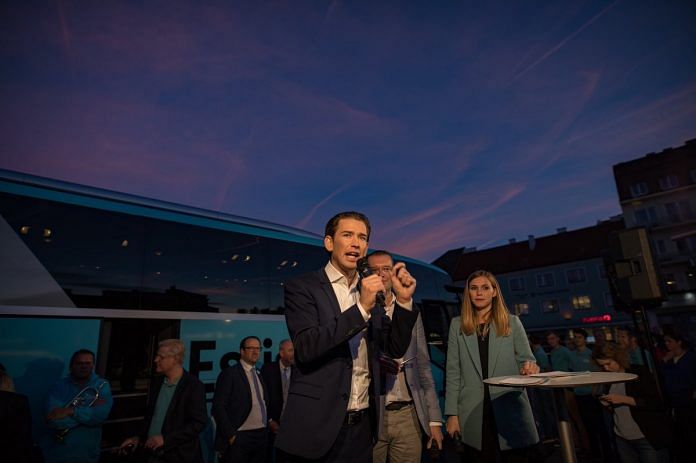Europe’s young, ambitious and divisive
A 31-year old is all set seize power in Austria thanks to his anti-immigration rhetoric. But Sebastian Kurz is far from being Europe’s last ambitious, young and divisive leader. In fact, one should expect plenty more, writes Emily Schultheis in The Atlantic.
“By dragging the [Austrian People’s Party (ÖVP)] sharply to the right on immigration and migration, his signature issue, he seeks to co-opt the political space previously monopolized by the Freedom Party,” Schultheis writes.
“As traditional centrist political parties across Europe reel from historic losses, Kurz’s strategy in Austria seems to have paid off. With his victory, he’ll no doubt serve as an example for other ambitious young center-right leaders looking to rebuild support and come out ahead of their right-wing populist challengers. As a polished, anti-immigration millennial who successfully worked to remake his party, Kurz could be a sign of what’s to come from the next generation of European leaders — one that is running and governing in a time of turbulent political change across the continent.”
The Kurdish miscalculation
For the United States, watching the crisis over Kirkuk is “a dilemma of watching one friend make a damaging mistake, and another friend retaliate,” writes David Ignatius in The Washington Post.
“The Kurdish miscalculation (Kurdistan President Masoud Barzani’s decision to go ahead with a controversial independence referendum) has had unfortunate consequences. But sometimes in the Middle East, mistakes open the way for new discussions, and U.S. officials hope this will be the case with the Kirkuk crisis. U.S. officials were working Monday to establish joint security measures to reduce tensions near the Kirkuk oil fields, so that production can continue, and to share information on the ground and counter inflammatory reports that could escalate the conflict. Officials hope these initial military and intelligence contacts will be a prelude to a broader political discussion involving Barzani and (Iraqi Prime Minister Haider al-)Abadi.”
“Iran may not be pulling all the strings in Iraq, but it has a decisive presence there and will benefit from the confrontation between Abadi and the Kurds. That’s the unfortunate irony of the Kirkuk clash: In a week when the Trump administration was trying to launch a new campaign to counter Iran’s regional behavior, U.S. officials must struggle to extinguish a sudden flare-up between the United States’ two key partners in Iraq — one that’s all the more frustrating because policymakers in Washington saw it coming.”
EU’s war with populism
Could the European Union have done more to calm tensions between Madrid and Catalonia before they spiraled out of control?
“The truth is there is plenty of blame to go around for the Catalonia crisis, and the European Union certainly shares some of it. European Union officials did hold closed-door meetings to try to calm tensions, but they could have done much more earlier to encourage dialogue between Barcelona and Madrid before it was too late. They also should have been clearer in their condemnation of police violence against Catalan voters on Oct. 1,” writes Susi Dennison in The New York Times.
But Catalonia is only Europe’s latest battle in “European Union’s war with populism”. “The longer-term responsibility of the European Union’s political leaders is to deal with the causes, not the symptoms, of the growing power of populist forces, of which the Catalonian independence movement is just one.
They need to defuse the desire for an alternative on which populists are playing, by tackling the issues that European citizens care about — identity, jobs, responsive public services and security.”
Yes, me too. Now what?
“Of course, I’ve been sexually harassed,” writes Alyssa Rosenberg in The Washington Post. But “When women and some men started sharing their stories of sexual harassment and assault on social media using the hashtag #MeToo, it almost didn’t occur to me to join in.”
The hashtag, she believes, simply glosses over some questions. “How does someone like (Harvey) Weinstein convince himself that this is normal, that this is fine, that “I’m used to that” and therefore this must be all right? At what point do people decide that they can just take what they want? And how can we possibly stop them before they get there?”
“I don’t know the answers to these questions or the outcome of these legislative fights. But I do know that for #MeToo to be worth it, the result can’t just be that we make ourselves feel bad by revisiting painful memories and hearing stories that reveal the depth of our own denial. All this pain needs to turn into concrete action, or we’ll be back here again in 20 or 30 years — and the stories we tell then may be even worse.”
‘We need to save our own souls’
“What shocks me the most is the people are so privileged in Europe or in elsewhere, and not to taking the refugee condition seriously.”
“But we are—when we start to accept those unacceptables, that tells our human condition how bad that can be. And the refugees are not people we need to really save them (sic), but rather we have to save our own soul and our own mind, and our own society. So this is so much connected, and this kind of consciousness and alert, it should be easily understood today.”



